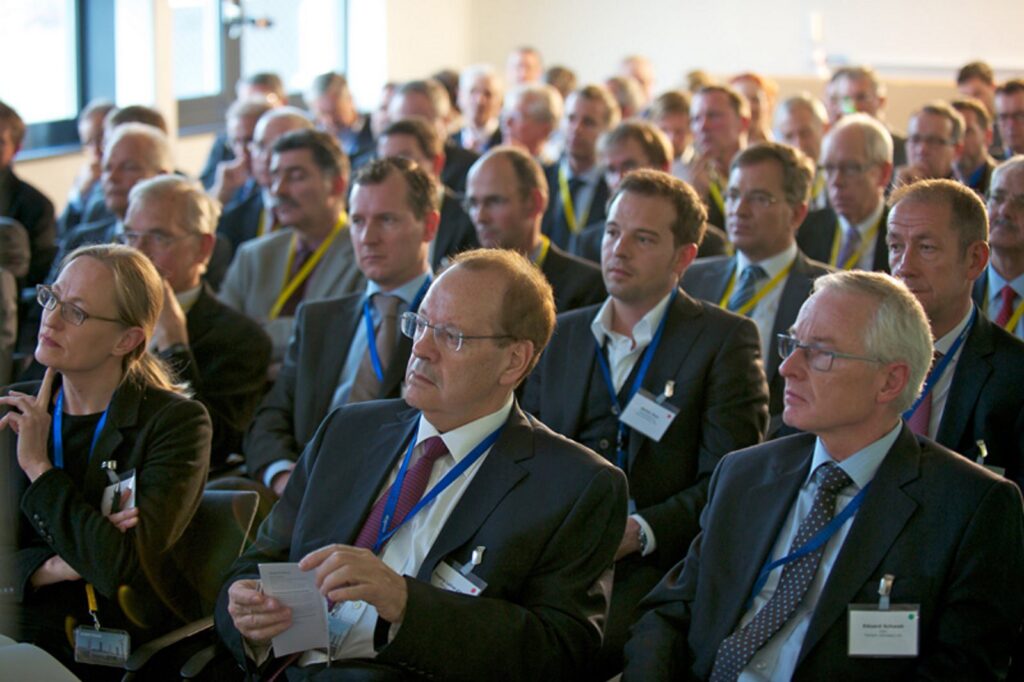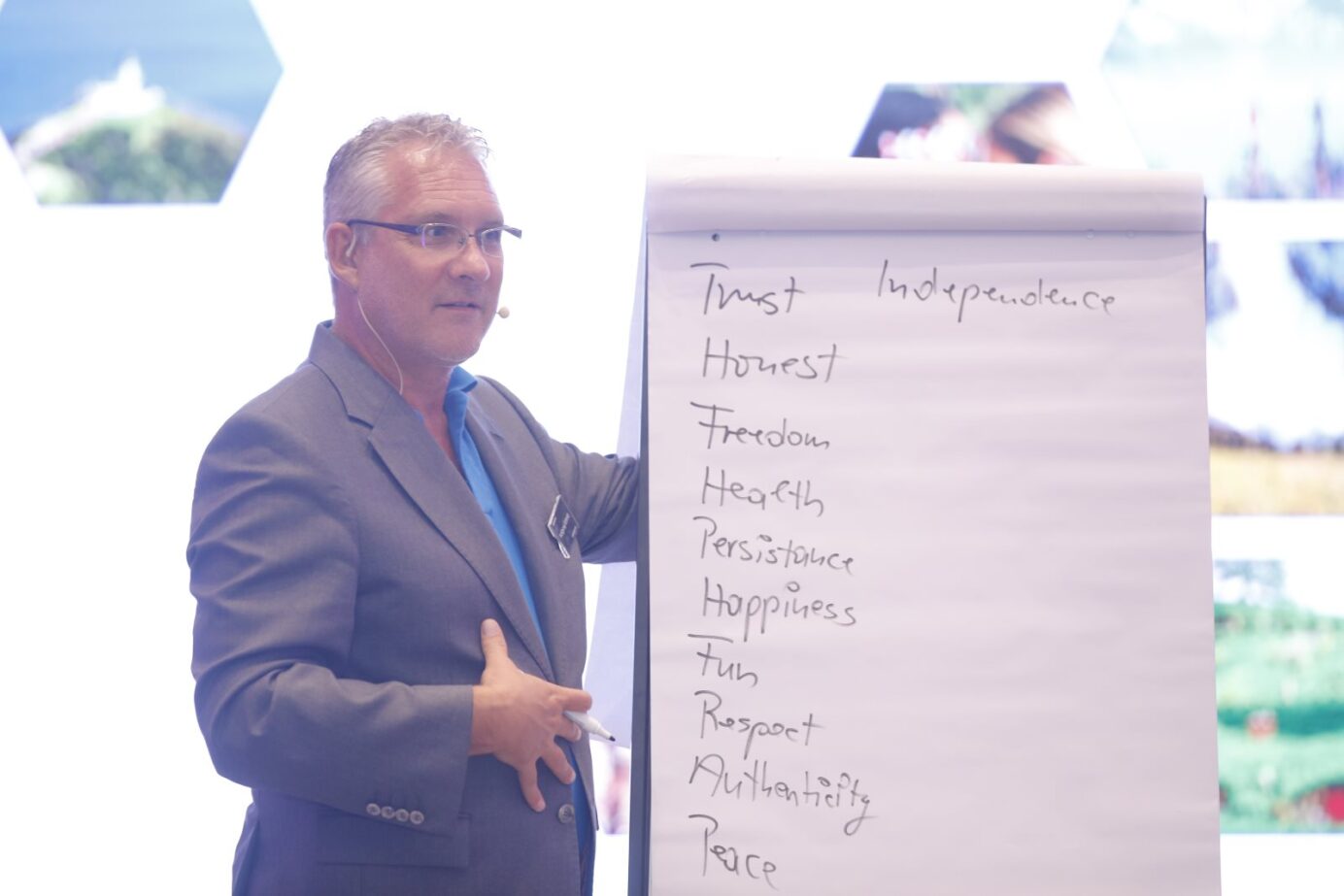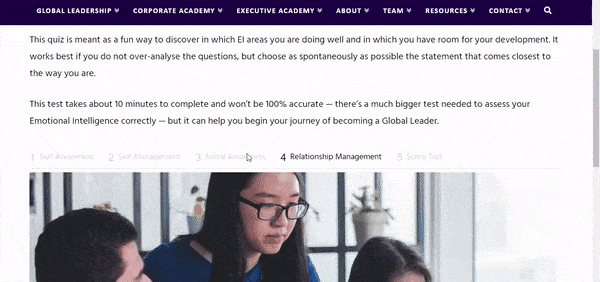“Emotional Intelligence is success factor Number One for global leaders.”
Dr. Wolfgang Schmitz, founder & CEO of European Academy for Executive Education (eurac)
The Global Leadership Foundation has developed an online Global Emotional Intelligence Test (GEIT) specifically for global leaders to provide a guide as to how they’re scoring on an emotional intelligence (EI) level. The test strives to support global leaders in giving them a point to start from in their quest for self-development.
While it doesn’t guarantee complete accuracy, the GEIT does indicate that emotional intelligence is an important success factor in terms of global leadership.
So we sat down again with Dr. Wolfgang Schmitz, founder and CEO of eurac establishment, to talk about emotional intelligence and its significance for global leaders.
Defining emotional intelligence
According to Dr. Schmitz “emotional intelligence is the ability to accurately perceive your own and other’s emotions; to understand the signals which emotions communicate between people, and the ability to effectively manage your own and others’ emotions.”
For Dr. Schmitz, emotional intelligence goes far beyond having empathy or being sensitive. It’s a common misconception that these are markers for emotionally intelligent people. Many people openly demonstrate their emotions. But that doesn’t automatically mean they are able to manage their emotions, or that they have a sense for other people’s emotions.
Instead, being emotionally intelligent involves intra-personal (your own) as well as inter-personal (involving others) management competence – recognizing your own and other people’s feelings, and being open and able to manage your own emotions as well as others’ (can’t stress this enough) in an effective way.
Display of emotions across cultures
Different cultures handle emotions in different ways. We all feel them, but the way we respond to them can differ drastically. Latino cultures, for example, are prone to showing their emotions very openly, while Asians tend to hide their emotions.
Being aware of these differences as a global leader helps, but you could – and as a global leader should – go deeper. People from different cultures or nations may respond similarly to emotions. But their reasons for doing so, their backgrounds, may differ.
Take China and Japan, for instance. Both Chinese and Japanese people tend to keep their emotions tightly under wraps, never showing them to outsiders, especially strangers or colleagues. But they do this for very different reasons.
China’s is a history of repression. For over 3,000 years, the Chinese were ruled by imperial dynasties; then Communism took over at the beginning of the 20th century. Over this time, spanning so many generations, China turned into what Dr. Schmitz calls a “mistrust society”. They have learned that any outwardly shown emotion may be used against them. As an outsider, it’s incredibly difficult to gain their trust and become part of their inner circle. The Chinese don’t easily trust anyone except their closest family members – and so they don’t show emotion to anyone but their family core.
Japan has a different history. It’s the country with one of the most hierarchical thinking and structure, and a society governed by rules. These rules are taught and lived from a very young age, and the Japanese follow them strictly. Compared to the Chinese, Japanese people will trust outsiders more easily. But it’s a rule to serve those in a higher hierarchy, and another rule to not make other people feel bad through or because of your emotions – especially those in a higher hierarchy. Emotions aren’t shown because they may influence or even manipulate people, which is against the rules.
As we see, even though these two cultures handle emotions in a very similar way – by not expressing them – their reasons for doing so differ. Which means their reactions in dealing with their own and other people’s emotions will differ, for example within a global team. A global leader must be aware of, recognize and be able to manage the differences in emotions that different people from different cultures display.

The importance of emotional intelligence in global leaders
According to Dr. Schmitz, “a global leader’s journey is about personal transformation. This means it’s about managing a range of tasks and relationship complexities across a wide array of internal and external constituents from multiple national cultures and jurisdictions.”
To succeed in that complex role means being competent in managing your own and others’ emotions – the definition of emotional intelligence. Without emotional intelligence, a global leader won’t be able to navigate the relationship complexities that come with running a global team.
Let‘s get down to the nitti-gritty: Is EI more important than IQ in global leaders?
In Dr. Schmitz’ (carefully expressed) opinion, emotional intelligence is success factor Number One for global leaders. In a leadership setting, emotional intelligence matters more than a person’s intelligence quotient (IQ).
A high IQ means little if a global leader isn’t able to communicate, mitigate, motivate or generally establish good relationships within his team. Employees no longer work alone at their desks from nine to five. They interact, communicate, strategize, plan, develop, research, laugh and even eat together. Every team member takes on a specific role, according to their strengths and weaknesses, and different situations will have them react in different ways.
As a leader, if you can’t grasp those nuances of your team members’ emotions, and know how to manage them, you have no chance of running a happy, successful team. Especially as a global leader.
This doesn’t mean that global leaders don’t need an education on an intellectual level! It would be just as wrong to state that a global leader has to work on or educate himself only on emotional intelligence.
But generally, global leadership is more about leading your team or employees, rather than working on the subject matter yourself. And that’s why EI is more important than IQ in the context of global leadership.
Back to the Global Emotional Intelligence Test (GEIT): How must global leaders score on it to show global leadership potential?
The GEIT evaluates people via four competencies:
- Self-Awareness – the conscious knowledge of one’s own character, feelings, motives, and desires.
- Social Awareness – the ability to understand and respond to the needs of others.
- Self-Management – the management of or by oneself; the taking of responsibility for one’s own behavior and well-being.
- Relationship Management – the ability to identify, analyze, and manage relationships with people inside and outside your team, as well as their development through feedback and coaching. It incorporates a person’s ability to communicate, persuade, and lead others, whilst being direct and honest without alienating people.
The score ranges from 1 – 10 points on each of these attributes. On general terms, Dr. Schmitz stipulates that a successful global leader must range at least to an eight or higher on all four. But of course, it’s not that easy. The necessary ranking of competencies always depends on the scenario.
So let’s come up with a scenario as an example: A global leader is leading a team of six people, with three members located in the US and three in Mexico. In this situation, Dr. Schmitz says, the global leader needs to score highest, at least an eight, on social awareness and relationship management.
A high social awareness is necessary because of the collaboration of people from different countries and cultures, as well as them sitting in different locations. And a high relationship management competence is important in order to gain deeper influence, inspire, build and grow them as a team, and also mentor them.
But! Let’s assume this global leader, while having top notch social awareness and relationship management competence, has low self-awareness. He won’t be able to recognize his own feelings, or manage them – meaning he won’t be successful in trying to manage that team. They will give him feedback or implicit signs; he might be able to read them because he has a good inter-personal sense, but without intra-personal competence, i.e. self-awareness, he won’t be able to change.
To sum up: In general, a person must score an eight or higher in all four competencies of the GEIT, to have the potential to be a true global leader. But the relevance of the competency ranking also depends on the situation and can be different for every team, every global leader and every situation.
So what if you find yourself lacking in one competency? What if you score lower than seven or lower in one or more, thereby displaying a disadvantage in crucial aspects of emotional intelligence?
Don’t worry. You’re not necessarily stuck with your low ranking. First of all, the Global Leadership Foundation doesn’t guarantee the accuracy of the results of the GEIT. Second – and more important – emotional intelligence is something you can improve in terms of self-development.

5 steps to improving your EI to become a more effective and competent global leader
Dr. Schmitz sees five important steps to improving your emotional intelligence to becoming a better global leader.
Step 1: Motivation
There’s not enough extrinsic motivation – meaning it’s imposed on you by others – in the world to make you open to learning and changing if you don’t want it. An intrinsic motivation, desire and openness to change and learn and especially grow, are crucial in improving your emotional intelligence.
Without them, the next four steps become irrelevant.
Step 2: Gather honest feedback
If you’re intrinsically motivated and serious about improving your emotional intelligence, Dr. Schmitz suggests you gather very honest feedback about your strengths and weaknesses from as many different people in your life as possible; your colleagues, employees, superiors, spouse, friends, relatives – any- and everybody who is part of your circle.
We all take on different roles in different settings. In a work environment we’re a colleague, an employee, a boss, a collaborator. Outside of work we take up the social roles of parent, sibling, spouse, relative and friend. And of course there’s that third, private role you play you, yourself and your passions, which are also uniquely reflected and expressed in your emotions.
Gathering honest feedback from all players interacting with you in all your different roles will show where your true growth opportunities lie.
Step 3: Develop a learning plan
Once you know in which areas you want to work on yourself, set up a learning plan. Break it down into SMART mini targets and determine how you will reach them.
Step 4: Get a coach
If you want to stay on target, Dr. Schmitz advises to find a coach. This can be a professional coach or your best friend. It doesn’t really matter who it is, as long as they’re able to nudge you back towards your targets when you veer off the path. Someone you trust, who wants to help and support you, and who themselves have the intelligence to discuss and come up with solutions.
You want to find someone who is aware of your blind spots and not afraid to point them out to you. This is something you need another person for; it is very difficult to recognize them yourself. They’re called “blind” spots for a reason, after all.
Step 5: Practice, practice, practice
Start following the plan. Practice every day, at every naturally occurring opportunity. If necessary, adjust the plan and keep going. Keep gathering feedback.
Improving any or all four competencies necessary for high emotional intelligence isn’t done in a day. It involves a resetting of neural pathways in your brain, in the way you react to certain situations, in the way you approach people and in the way you interact with them. This takes time and practice, and it’s why Step 1, the motivation to go through with it, is so important.
No global leadership without emotional intelligence
In conclusion, emotional intelligence is incredibly important for leaders in general, but even more so for global leaders. A high emotional intelligence is, in fact, of higher value to a global leader than a high intelligence quotient.
To be a successful global leader you must rank very highly in all four competencies of emotional intelligence, meaning self-awareness, social awareness, self-management and relationship management. The GEIT helps you determine which of these competencies you might need to work on.
Because, yes, you can improve your emotional intelligence to the level of a global leader’s if you are intrinsically motivated to do so. All you need is honest feedback from your professional, social and personal circles, a learning plan, a coach, and practice. No, it’s not necessarily easy. But is it worth it to become a successful global leader?
Well, that’s for you to decide.
Once you’ve made up your mind to grow as a global leader, you should sign up for more information about global leadership here at eurac. We’ll keep you up to date on the latest trends, events, interviews and research on everything about global leadership.


